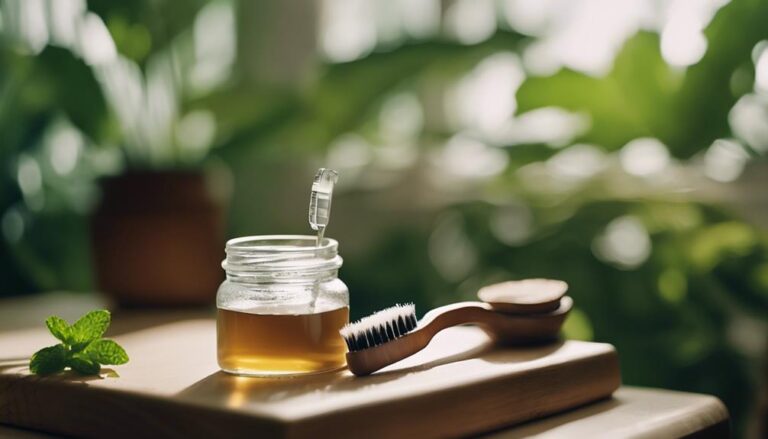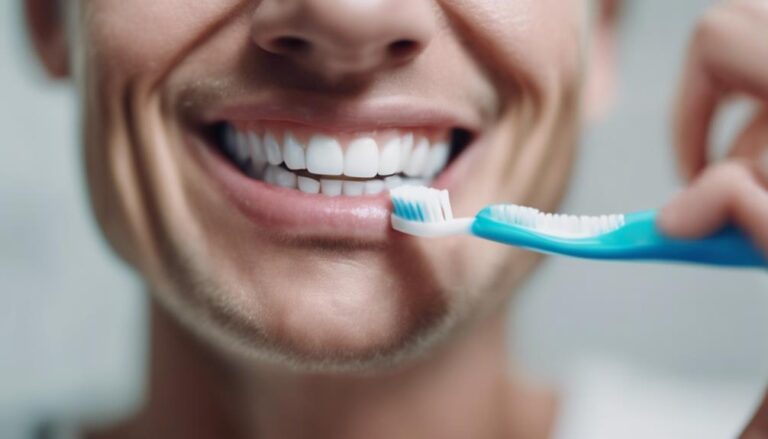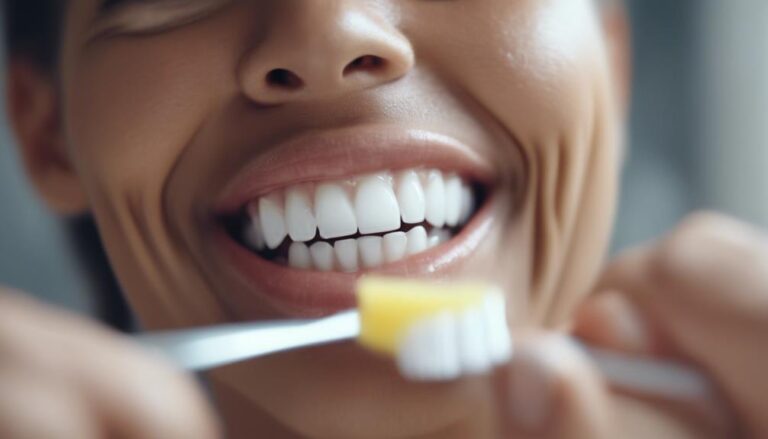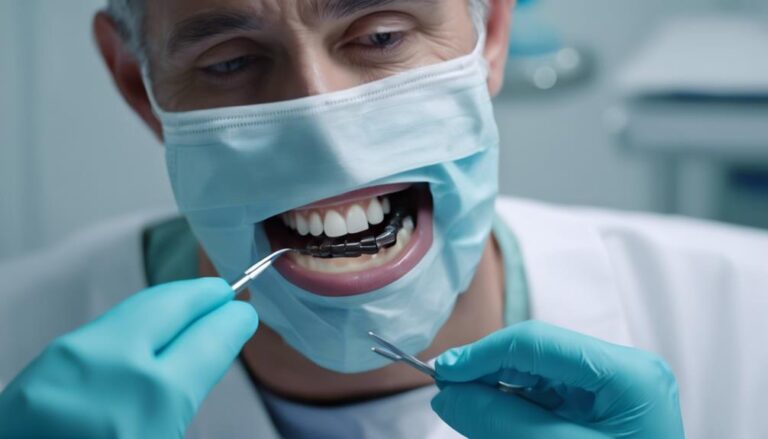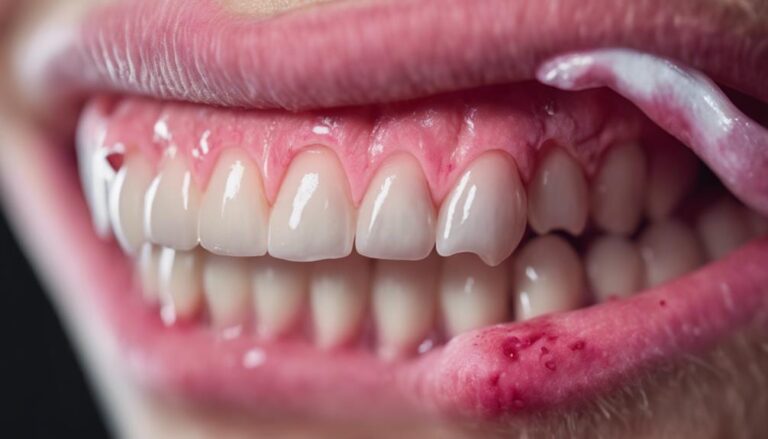To effectively manage halitosis and gum disease, embrace a holistic approach. Make dietary changes by opting for fruits and vegetables while reducing sugary foods. Guarantee proper oral hygiene through flossing and tongue cleaning. Regular dental check-ups are vital for preventive care and early problem detection. Deep cleaning complements oral health, supported by antimicrobial mouthwash benefits. Explore probiotics and herbal remedies for added support. Stress management techniques play a significant role in overall oral health. Embracing these practices harmoniously promotes healthy gums and fresh breath. Discover more ways to enhance your oral health journey through additional strategies available.
Key Takeaways
- Regular dental visits for preventive care and early detection.
- Proper oral hygiene with flossing and tongue cleaning.
- Antimicrobial mouthwash to reduce harmful bacteria.
- Deep cleaning like scaling and root planing for gum disease.
- Consider surgical or laser treatments for advanced cases.
Lifestyle Changes
When addressing halitosis and gum disease, making lifestyle changes can greatly impact your oral health and overall well-being. Dietary changes play an essential role in oral health. Consuming a balanced diet rich in fruits and vegetables can help prevent gum disease by providing essential nutrients that support gum health. Additionally, reducing the intake of sugary and acidic foods can lower the risk of cavities and bad breath.
Stress reduction is another key aspect of maintaining oral health. High stress levels can weaken the immune system, making the gums more susceptible to infection. Incorporating stress-reducing activities such as mindfulness meditation or deep breathing exercises into your daily routine can help alleviate stress and promote healthier gums.
Furthermore, establishing a regular exercise routine and maintaining good sleep habits can also positively impact your oral health. Exercise improves blood circulation, which is essential for healthy gums, while adequate sleep allows the body to repair and regenerate oral tissues. By prioritizing these lifestyle changes, you can effectively combat halitosis and gum disease while enhancing your overall well-being.
Proper Oral Hygiene
Maintaining proper oral hygiene is essential for preventing halitosis and gum disease. To make sure your oral health is in top condition, consider the following tips:
- Flossing Techniques: Proper flossing is vital for removing plaque and food particles between teeth that brushing alone may miss. To floss effectively, gently guide the floss between each tooth, curve it around the base of each tooth in a C shape, and avoid snapping it against the gums which can cause irritation.
- Dietary Changes: A diet high in sugary and acidic foods can contribute to tooth decay and gum disease. Opt for a balanced diet rich in fruits, vegetables, and lean proteins to support oral health.
- Breath Fresheners and Tongue Cleaning: Breath fresheners like sugar-free gum or mints can temporarily mask bad breath, but addressing the root cause is essential. Additionally, cleaning your tongue with a tongue scraper can help remove bacteria responsible for causing bad breath.
Regular Dental Visits
Regular dental visits play an important role in maintaining excellent oral health and preventing potential issues such as halitosis and gum disease. It’s during these routine check-ups that dentists can provide essential preventive care to keep your teeth and gums healthy. For those who experience dental anxiety, many dental practices offer dental anxiety management techniques to help make the visit more comfortable. Additionally, dentists can discuss sedation options for those who may need extra support to relax during procedures.
During regular dental visits, dentists focus on cavity prevention through professional cleanings, fluoride treatments, and thorough examinations. These visits allow for the early detection of any oral health problems, enabling prompt intervention and treatment. By attending these appointments as recommended, individuals can greatly reduce their risk of developing gum disease and other serious oral health conditions.
Deep Cleaning
Deep cleaning, also known as scaling and root planing, is a thorough dental procedure aimed at removing plaque and tartar buildup from below the gumline to treat gum disease effectively. This treatment is essential for maintaining oral health, especially when gum disease is present.
Key Points:
- Flossing Techniques and Preventive Measures: Proper flossing techniques are vital to prevent plaque buildup between teeth, complementing the effects of deep cleaning. Regular flossing can help maintain the results of the procedure and prevent future gum disease.
- Tooth Sensitivity and Pain Management: After deep cleaning, some individuals may experience tooth sensitivity. This can be managed with desensitizing toothpaste recommended by your dentist. Over-the-counter pain relievers can help alleviate any discomfort post-treatment.
- Follow-Up Care: It’s essential to follow any post-treatment instructions provided by your dentist diligently. Regular dental check-ups are crucial to monitor your oral health and ensure the effectiveness of the deep cleaning procedure.
Antimicrobial Mouthwash
After completing a deep cleaning procedure, incorporating an antimicrobial mouthwash into your oral care routine can further enhance the effectiveness of your gum disease treatment. Antimicrobial mouthwashes contain specific agents designed to target and reduce harmful bacteria in the mouth, promoting a healthier microbial balance. These mouthwashes offer various benefits, such as reducing plaque buildup, decreasing inflammation, and combating bad breath.
The efficiency of antimicrobial mouthwashes lies in their ability to reach areas in the mouth that may be difficult to clean with brushing and flossing alone. By using these mouthwashes as part of your daily oral hygiene regimen, you can help prevent the progression of gum disease and maintain excellent oral health.
It’s important to note that antimicrobial mouthwashes aren’t a standalone treatment for gum disease but rather a complementary addition to regular brushing, flossing, and professional dental cleanings. Consult with your dentist to determine the most suitable antimicrobial mouthwash for your specific oral health needs.
Antibiotics
Utilizing antibiotics in conjunction with professional dental guidance and proper oral hygiene practices can play an important role in combating bacterial infections associated with gum disease. When considering antibiotics as a treatment option, it’s essential to be aware of the following:
- Alternative treatments: Before resorting to antibiotics, it’s advisable to explore alternative treatments such as antimicrobial mouthwashes or scaling and root planing, which can be effective in managing gum disease without the risk of bacterial resistance associated with antibiotics.
- Bacterial resistance: Overuse or misuse of antibiotics can lead to bacterial resistance, rendering them less effective over time. Therefore, antibiotics should be prescribed judiciously and for the appropriate duration to minimize this risk.
- Side effects, dosage recommendations: Antibiotics can have side effects ranging from mild gastrointestinal disturbances to severe allergic reactions. It’s important to follow the prescribed dosage recommendations and complete the full course of antibiotics as directed by the healthcare provider to ensure effectiveness and minimize the development of antibiotic resistance.
Scaling and Root Planing
Scaling and Root Planing is a non-surgical procedure commonly performed by dental professionals to treat gum disease by removing plaque and tartar from below the gumline. This deep cleaning method aims to eliminate bacteria that cause inflammation and infection, aiding in the reduction of gum recession and tooth sensitivity often associated with periodontal disease. By smoothing out the tooth roots during root planing, this procedure helps prevent further plaque buildup, promoting gum tissue reattachment and healing.
In addition to addressing gum disease, Scaling and Root Planing can also have positive effects on preventing enamel erosion and tooth decay. When bacteria-laden plaque and tartar are left unaddressed, they can contribute to the breakdown of enamel, leading to cavities and other dental issues. By removing these harmful substances through Scaling and Root Planing, the risk of enamel erosion and subsequent tooth decay can be notably reduced, supporting overall oral health and hygiene.
Gum Surgery
To address more severe cases of gum disease, gum surgery may be recommended by dental professionals as a treatment option. Gum surgery, also known as periodontal surgery, aims to treat advanced gum disease that can’t be addressed through non-surgical methods like scaling and root planing.
Here are some key points regarding gum surgery:
- Recovery Process: After gum surgery, it’s essential to follow post-operative care instructions provided by your dentist or periodontist. This may include managing pain and swelling, sticking to a soft diet, and avoiding strenuous activities for a period of time.
- Long Term Effects: Gum surgery can have long-lasting benefits for patients with severe gum disease. It can help prevent further progression of the disease, reduce pocket depths around the teeth, and improve overall oral health.
- Surgical Options: There are different types of gum surgeries available, including flap surgery, gingivectomy, and gum grafts, each tailored to address specific gum disease conditions and individual patient needs. Consulting with your dental professional can help determine the most suitable surgical option for your case.
Laser Therapy
Laser therapy presents a modern approach to treating gum disease, offering precision and minimally invasive procedures for patients. With laser technology advancements, this treatment has gained recognition for its effectiveness in targeting diseased areas while preserving healthy tissue. Studies have shown that laser therapy can result in reduced bleeding, swelling, and discomfort compared to traditional gum surgery. Patients often report higher satisfaction levels due to the minimal pain and shorter recovery times associated with laser procedures.
In terms of clinical effectiveness, laser therapy has been found to promote gum tissue regeneration and reduce inflammation. The precision of the laser allows for more accurate treatment of periodontal pockets, leading to improved long-term results. Additionally, the minimally invasive nature of the procedure can help prevent future complications and promote faster healing. Overall, laser therapy continues to demonstrate its value in the treatment of gum disease, offering patients a promising alternative with positive outcomes.
Tongue Scraping
Utilizing a tongue scraper is an important practice in maintaining oral hygiene and combating halitosis effectively. Tongue cleaning plays a vital role in preventing bad breath by removing bacteria, food debris, and dead cells from the tongue’s surface. Here are three key reasons why tongue scraping is essential for oral health:
- Halitosis Prevention: The majority of bad breath originates from the bacteria and debris that accumulate on the tongue. Regularly scraping the tongue helps eliminate these odor-causing substances, leading to fresher breath.
- Oral Hygiene Enhancement: In addition to brushing and flossing, tongue cleaning completes the oral care routine by targeting the specific areas where bacteria tend to hide. This thorough approach significantly reduces the risk of gum disease and other oral health problems.
- Improved Taste Perception: A clean tongue not only helps maintain fresh breath but also enhances the ability to taste flavors accurately. By removing the buildup that can dull taste receptors, tongue scraping promotes a more enjoyable eating experience while supporting overall oral health.
Probiotics
Probiotics have shown promising results in promoting oral health by balancing the oral microbiome and reducing harmful bacteria. These beneficial bacteria can help maintain a healthy balance in the mouth, which is essential for preventing conditions like halitosis (bad breath) and gum disease. Probiotic benefits extend beyond gut health, impacting oral health positively as well. Research suggests that probiotics can inhibit the growth of pathogenic bacteria in the oral cavity, thereby reducing the risk of oral infections and inflammation.
Studies have indicated that certain strains of probiotics, such as Lactobacillus reuteri and Lactobacillus salivarius, can help improve gum health by reducing plaque buildup and inflammation. By introducing these beneficial microbes into the oral microbiome, probiotics can support the natural defense mechanisms of the mouth, contributing to overall oral health.
Incorporating probiotic-rich foods like yogurt, kefir, and fermented vegetables into your diet can be a simple way to enhance oral health. However, consulting with a healthcare provider is advisable before starting any probiotic regimen to make sure it aligns with individual health needs.
Nutritional Supplements
In exploring oral health solutions, the discussion naturally shifts towards the potential benefits of incorporating nutritional supplements into one’s routine. When considering nutritional supplements for addressing halitosis and gum disease, several key factors should be taken into account:
- Dietary adjustments: Ensuring a well-balanced diet rich in essential nutrients like vitamin C, D, and calcium can have a notable impact on oral health by supporting gum strength and overall immune function.
- Nutrient deficiencies: Identifying and addressing any nutrient deficiencies through supplementation can help combat inflammation, promote tissue repair, and enhance the body’s ability to fight off oral infections.
- Alternative therapies: Some herbal remedies have shown promise in supporting gum health and reducing bad breath. For example, green tea extract has antioxidant and anti-inflammatory properties that may benefit oral health when used as a supplement.
Aloe Vera Gel
Aloe Vera gel, known for its soothing properties, has been recognized for its potential benefits in promoting oral health. Scientific evidence suggests that Aloe vera contains antibacterial and anti-inflammatory properties that can help in fighting gum disease and reducing bad breath. The benefits of Aloe vera extend to its ability to accelerate wound healing, making it a promising natural remedy for oral conditions.
When considering DIY aloe vera remedies for oral health, it’s essential to use pure Aloe vera gel. One popular method is to mix Aloe vera gel with water to create a mouth rinse that can be used daily. This homemade solution may help in reducing plaque buildup and soothing gum inflammation. Additionally, applying Aloe vera gel directly to the gums can provide relief from irritation and promote healing.
Incorporating Aloe vera into your oral care routine can be a simple and cost-effective way to support gum health and combat halitosis. Its natural properties make it a valuable addition to home use remedies for maintaining good oral hygiene.
Oil Pulling
Oil pulling, a traditional oral hygiene practice originating from ancient Ayurvedic medicine, involves swishing oil in the mouth to improve dental health. This technique is gaining popularity in modern times due to its potential benefits.
When it comes to oil pulling, there are two main types that are commonly used:
- Coconut oil pulling: Coconut oil is known for its antimicrobial properties, which can help reduce harmful bacteria in the mouth. Scientific evidence suggests that coconut oil pulling may help in reducing plaque formation and improving overall oral hygiene.
- Benefits of sesame oil pulling: Sesame oil is another oil commonly used for oil pulling. Studies have shown that sesame oil pulling can help reduce the number of harmful bacteria in the mouth, leading to fresher breath and potentially improved gum health.
- Overall effectiveness: While more research is needed to fully understand the mechanisms behind oil pulling, incorporating this practice into your oral hygiene routine may provide additional benefits alongside regular brushing and flossing.
Stress Management
Exploring stress management techniques can complement oral hygiene practices like oil pulling in maintaining overall dental health. Stress relief techniques, such as relaxation exercises, play an important role in preventing conditions like gum disease and halitosis. Chronic stress can weaken the immune system, leading to increased inflammation and susceptibility to oral health issues.
Engaging in mindfulness practices, such as meditation, has shown promising benefits in reducing stress levels and improving overall well-being, which can positively impact oral health.
Mindfulness practices like meditation help individuals cultivate a sense of calm and focus, reducing the body’s stress response. This, in turn, can prevent stress-related oral health issues like teeth grinding and gum inflammation.
Frequently Asked Questions
Can Halitosis Be a Sign of a More Serious Health Condition?
Halitosis can indicate underlying medical conditions such as respiratory infections or liver disease. Seeking medical advice is essential for proper diagnosis and treatment. Regular dental check-ups, good oral hygiene, and hydration are key prevention strategies.
Are There Any Natural Remedies for Halitosis and Gum Disease?
In my experience, I’ve found that herbal remedies like essential oils, probiotics, and oil pulling can be effective in managing halitosis and gum disease. These natural options complement traditional treatments and promote oral health.
How Can Smoking and Alcohol Consumption Impact Oral Health?
Smoking and alcohol consumption can greatly impact dental hygiene, leading to gum disease and bad breath. These lifestyle choices can weaken the immune system in the mouth, making it harder to fight off bacteria and infections.
Can Hormonal Changes During Pregnancy Affect Halitosis and Gum Disease?
Pregnancy hormones pose potential problems for dental health. Prioritizing oral care during this time is essential. Understanding the impact of pregnancy hormones on gum disease and halitosis allows for proactive management and maintenance.
Are There Any Specific Foods That Can Worsen Halitosis and Gum Disease?
Maintaining healthy eating habits and excellent dental hygiene are essential in managing halitosis and gum disease. Certain foods, like sugary snacks, can exacerbate these conditions. Lifestyle choices heavily impact oral health; awareness is key.
Conclusion
To sum up, maintaining good oral hygiene habits and seeking professional dental care are key in effectively treating halitosis and gum disease.
By incorporating lifestyle changes, proper oral hygiene practices, regular dental visits, and utilizing treatments like antimicrobial mouthwash and aloe vera gel, individuals can improve their oral health.
Remember, a healthy smile isn’t only a sign of good health but also boosts confidence and overall well-being. So, don’t let bad breath or gum issues hold you back – take control of your oral health today.


